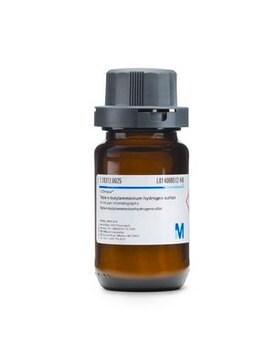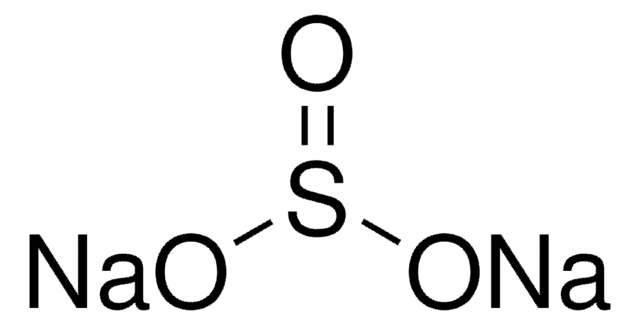791784
Tetrabutylammonium hydrogensulfate
anhydrous, free-flowing, Redi-Dri™, 97%
Synonyme(s) :
Tetrabutylammonium bisulfate
About This Item
Produits recommandés
Qualité
anhydrous
free-flowing
Niveau de qualité
Gamme de produits
Redi-Dri™
Essai
97%
Forme
crystals
Pf
169-171 °C (lit.)
Groupe fonctionnel
amine
Chaîne SMILES
OS([O-])(=O)=O.CCCC[N+](CCCC)(CCCC)CCCC
InChI
1S/C16H36N.H2O4S/c1-5-9-13-17(14-10-6-2,15-11-7-3)16-12-8-4;1-5(2,3)4/h5-16H2,1-4H3;(H2,1,2,3,4)/q+1;/p-1
Clé InChI
SHFJWMWCIHQNCP-UHFFFAOYSA-M
Vous recherchez des produits similaires ? Visite Guide de comparaison des produits
Description générale
Application
Informations légales
Vous ne trouvez pas le bon produit ?
Essayez notre Outil de sélection de produits.
Mention d'avertissement
Danger
Mentions de danger
Classification des risques
Acute Tox. 4 Oral - Aquatic Chronic 3 - Eye Dam. 1 - Skin Corr. 1
Code de la classe de stockage
8A - Combustible corrosive hazardous materials
Classe de danger pour l'eau (WGK)
WGK 2
Point d'éclair (°F)
348.1 °F - closed cup
Point d'éclair (°C)
175.6 °C - closed cup
Faites votre choix parmi les versions les plus récentes :
Déjà en possession de ce produit ?
Retrouvez la documentation relative aux produits que vous avez récemment achetés dans la Bibliothèque de documents.
Les clients ont également consulté
Notre équipe de scientifiques dispose d'une expérience dans tous les secteurs de la recherche, notamment en sciences de la vie, science des matériaux, synthèse chimique, chromatographie, analyse et dans de nombreux autres domaines..
Contacter notre Service technique












